The Process of Concrete Driveway Installation: A Step-by-Step Guide
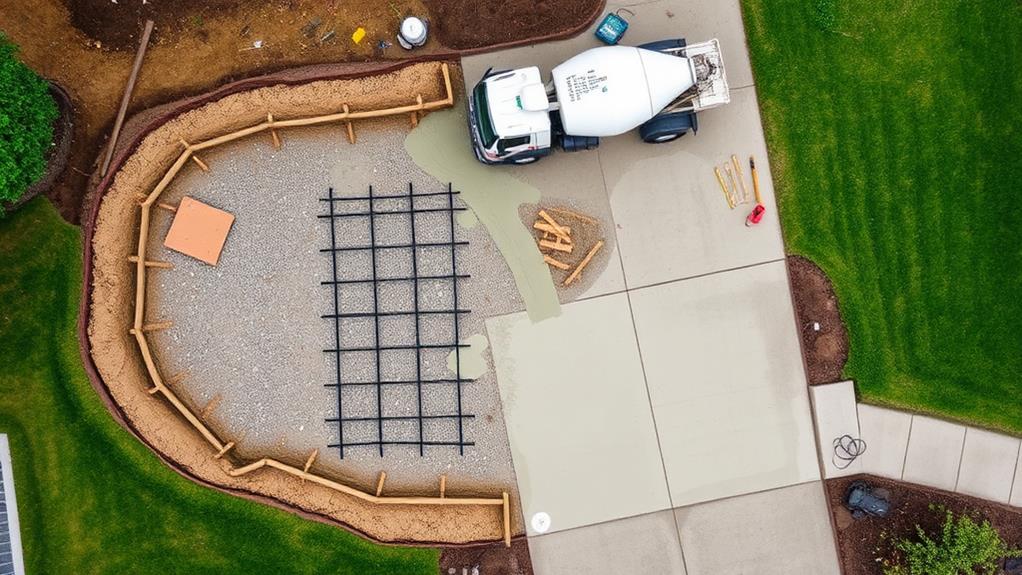
If you're considering a concrete driveway installation, you'll want to understand the process before diving in. A well-planned and executed installation can profoundly enhance your property's value and curb appeal. From site preparation to the final sealing, each step plays a pivotal role in creating a durable and attractive surface. But there's more to it than just pouring concrete and letting it dry. You'll need to navigate through various decisions, such as choosing the right contractor, selecting finishes, and ensuring proper reinforcement. Ready to explore the intricacies of this home improvement project? Let's break down the process step by step.
Concrete Contractor Highlights
- Site preparation involves clearing vegetation, grading for drainage, and compacting soil to create a stable base.
- Install wooden or metal forms and reinforcement materials like steel mesh or rebar before pouring concrete.
- Mix and pour concrete according to specifications, then level and smooth the surface using various tools.
- Place expansion joints at regular intervals and allow the concrete to cure for the recommended duration.
- Apply finishing touches like sealing, cleaning, and inspecting for imperfections to complete the installation process.
Concrete Contractor Services Residential And Commercial
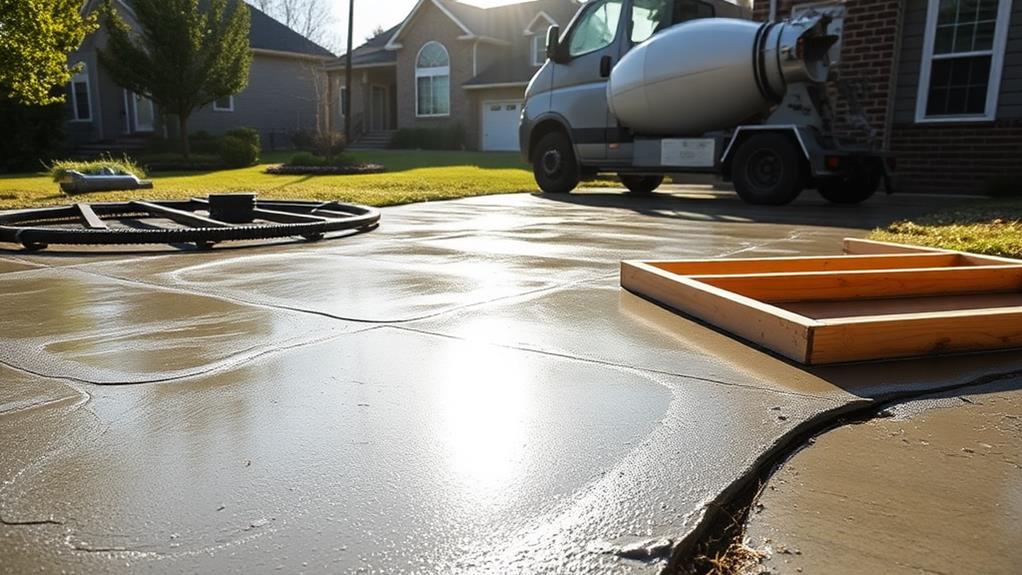
Our experienced concrete contractors offer thorough services for both residential and commercial properties, specializing in high-quality concrete driveway installation. We provide expert consultation, precise measurements, and custom design options to guarantee your driveway meets your specific needs and enhances your property's curb appeal.
At Concrete Leveling Solutions, Inc., our team uses industry-leading techniques and premium materials to create durable, long-lasting concrete surfaces that can withstand heavy traffic and various weather conditions. With decades of experience, we pride ourselves on being extensively trained and certified in the latest concrete techniques, ensuring that each project is executed with meticulous attention to detail.
From site preparation and formwork to pouring, finishing, and curing, we handle every aspect of the installation process. Whether you require a simple residential driveway or a complex commercial parking area, our skilled professionals deliver exceptional results that add value to your property and meet all local building codes and regulations.
Site Preparation and Excavation
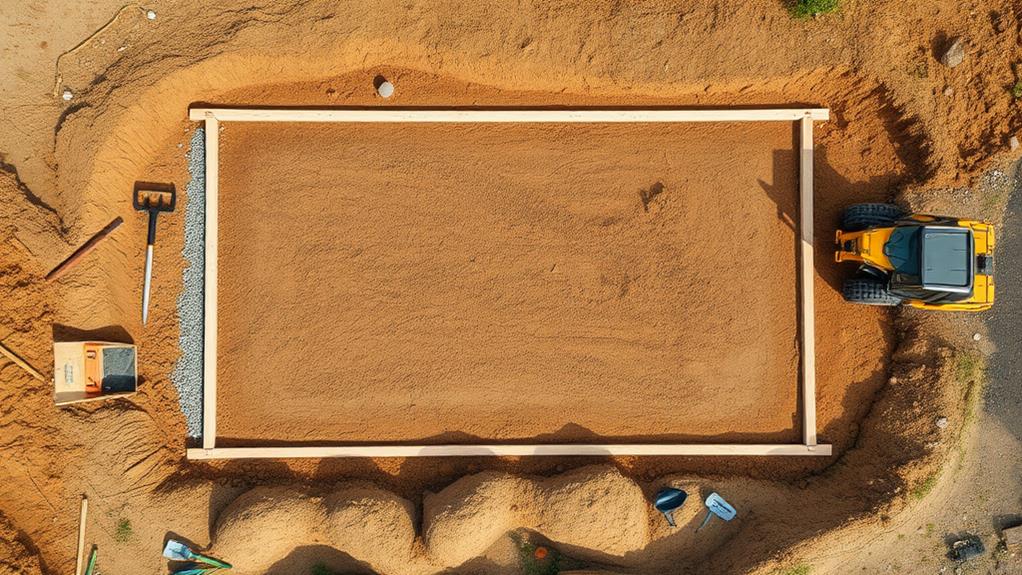
As you commence on your concrete driveway installation project, proper site preparation and excavation are pivotal first steps that lay the foundation for a durable and long-lasting result. Concrete driveways offer numerous benefits, such as enhanced appearance and increased property value, making meticulous preparation even more essential.
You'll need to begin by clearing the area of vegetation and debris, then carefully grade the site to guarantee proper drainage and a level surface for your new driveway. Once the site is prepared, you'll move on to compacting the soil, setting up forms to define the driveway's shape, and installing any necessary reinforcement materials, such as wire mesh or rebar, to enhance the concrete's structural integrity.
Clearing and Grading
The foundation of a durable concrete driveway begins with proper site preparation. As you commence this project, you'll need to focus on clearing and grading the area where your new driveway will be installed. Start by removing any existing vegetation, including grass, weeds, and small shrubs. You'll also need to clear away debris, rocks, and other obstacles that could interfere with the installation process.
Once the area is cleared, it's time to grade the site. This involves creating a smooth, level surface that will provide a stable base for your concrete driveway. You'll want to make sure that the ground slopes slightly away from your home to promote proper drainage. Use a transit level or laser level to check the grade and make adjustments as necessary. Fill in any low spots with compactable soil or gravel, and remove excess soil from high areas. Compact the soil thoroughly using a plate compactor or roller to create a solid foundation. This step is important for preventing future settling and cracking of your driveway.
Soil Compaction Techniques
Prior to pouring concrete, proper soil compaction is essential for guaranteeing a stable foundation. You'll need to employ various techniques to achieve optimal soil density, which will prevent settling and cracking of your driveway in the future.
Begin by using a plate compactor to compress the soil evenly across the entire area. This machine's vibrating plate will effectively consolidate loose particles, creating a firm base.
For larger areas or particularly challenging soil types, you may need to utilize a roller compactor. This heavy-duty equipment applies significant pressure to compact the soil thoroughly. In corners and along edges where machines can't reach, you'll want to use hand tampers to guarantee consistent compaction throughout the site.
It's pivotal to compact the soil in layers, typically 4-6 inches thick, to achieve uniform density throughout the substrate. You should also maintain proper moisture content in the soil during compaction, as this facilitates better particle adhesion. Use a moisture meter to monitor levels and adjust accordingly.
Forms and Reinforcement Setup
Typically, setting up forms and reinforcement marks a pivotal phase in driveway preparation. You'll need to install wooden or metal forms along the perimeter of your future driveway, ensuring they're level and properly aligned. These forms will serve as molds for the concrete, defining the shape and edges of your driveway. It's indispensable to secure them firmly to prevent shifting during the pour.
Next, you'll focus on reinforcement. This step involves placing steel mesh or rebar within the forms to enhance the concrete's structural integrity. The reinforcement helps distribute weight evenly and minimizes cracking due to temperature changes or ground movement. You'll need to elevate the reinforcement slightly off the ground using spacers, ensuring it's positioned correctly within the concrete.
It's essential to pay close attention to expansion joints during this phase. These joints allow for the natural expansion and contraction of concrete, preventing unwanted cracks. You'll install them at regular intervals and where the driveway meets other structures. By meticulously setting up forms and reinforcement, you're laying the foundation for a durable, long-lasting driveway that will serve you well for years to come.
Benefits
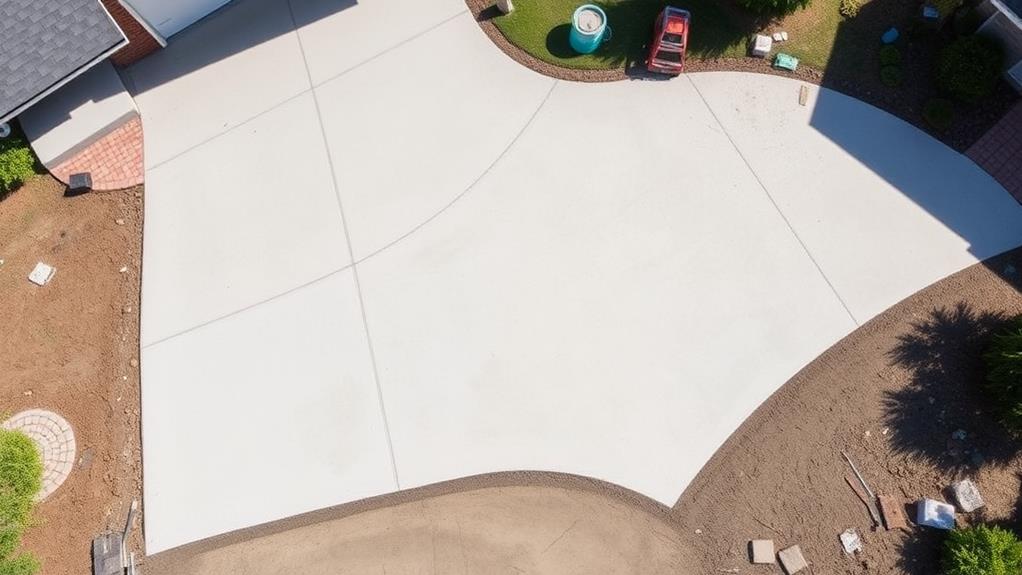
When you choose a concrete driveway for your property, you're investing in a host of benefits that extend far beyond mere functionality. You'll appreciate the substantial increase in your property's value, coupled with the remarkable durability and longevity that concrete offers, ensuring your driveway stands the test of time with minimal maintenance requirements.
Moreover, concrete driveways present a wide array of aesthetic appeal options, allowing you to customize the look to complement your home's exterior and landscape, from sleek, modern finishes to textured, rustic designs. Additionally, the seamless integration with existing landscaping makes it an ideal choice for those looking to enhance their home's curb appeal.
Increased Property Value
A well-installed concrete driveway often boosts your property's value considerably. When you invest in a high-quality concrete driveway, you're not just enhancing your home's curb appeal; you're making a strategic decision that can yield significant returns.
Prospective buyers are often willing to pay a premium for homes with well-maintained, attractive driveways, as they recognize the long-term benefits and reduced maintenance costs associated with concrete surfaces.
Your new concrete driveway serves as an indicator of your commitment to home improvement and signals to potential buyers that the property has been well-cared for. This perception of quality extends beyond the driveway itself, influencing how buyers view the entire property.
Additionally, a professionally installed concrete driveway can help your home stand out in a competitive real estate market, potentially reducing the time your property spends on the market. By choosing concrete over less durable materials, you're also providing future homeowners with the assurance of longevity and minimal upkeep, further increasing your home's marketability and value.
As you consider this investment, remember that a concrete driveway isn't just an expense but a valuable addition to your property's overall worth.
Durability and Longevity
Concrete driveways stand out for their exceptional durability and longevity, making them a wise investment for homeowners. When properly installed and maintained, your concrete driveway can last 30 years or more, weathering the elements and withstanding daily use. This resilience stems from concrete's inherent strength and its ability to distribute weight evenly, preventing cracks and damage from heavy vehicles.
You'll appreciate that concrete's durability extends beyond its structural integrity. It's resistant to oil stains, chemicals, and de-icing salts, which can deteriorate other materials. This resistance not only preserves your driveway's appearance but also reduces the need for frequent repairs or replacements. Additionally, concrete's thermal mass helps it withstand extreme temperature fluctuations, reducing the risk of freeze-thaw damage in colder climates.
The longevity of your concrete driveway is further enhanced by its low maintenance requirements. Unlike asphalt, which needs regular sealing, or gravel, which requires frequent replenishment, concrete demands minimal upkeep. An occasional power wash and resealing every few years will keep your driveway looking pristine and functioning ideally for decades, ensuring you'll enjoy its benefits for years to come.
Low Maintenance Requirements
Why spend countless hours and dollars on driveway upkeep when you can enjoy the low-maintenance benefits of concrete? Once installed, your concrete driveway will become an integral part of your property, requiring minimal attention to maintain its pristine condition. Unlike other materials, concrete resists the growth of weeds and grass, eliminating the need for regular trimming or herbicide application.
You'll find that concrete's smooth, uniform surface makes snow removal a breeze during winter months, saving you time and effort. Additionally, its resistance to oil and other automotive fluids means you won't have to worry about unsightly stains marring your driveway's appearance. Periodic sweeping and occasional power washing are typically all that's needed to keep your concrete driveway looking its best.
With proper installation and minimal care, your concrete driveway will continue to enhance your property's curb appeal for decades. The occasional application of a high-quality sealer can further extend its lifespan and maintain its aesthetic appeal. By choosing a concrete driveway, you're investing in a long-term solution that not only adds value to your home but also frees up your time for more enjoyable pursuits.
Aesthetic Appeal Options
Aesthetic flexibility sets concrete driveways apart from other materials. You'll find that concrete offers a wide array of design options to complement your home's exterior and enhance your property's curb appeal. From stamped patterns that mimic the look of brick or stone to integral coloring that infuses the entire slab with rich hues, you can customize your driveway to reflect your personal style and architectural preferences.
Consider the option of exposed aggregate finishes, which reveal the beauty of natural stones within the concrete mix, creating a textured and visually interesting surface. For a more refined look, you might opt for a polished concrete finish that brings out a sleek, modern aesthetic. Decorative scoring and borders can add visual interest and define spaces within your driveway design. Additionally, you can incorporate contrasting colors or materials to create unique patterns or highlight specific areas. These aesthetic enhancements not only elevate the appearance of your property but also contribute to its overall value. By choosing concrete for your driveway, you're investing in a surface that can be tailored to your exact specifications, ensuring a cohesive and attractive entrance to your home.
Decorative Concrete Finish Options
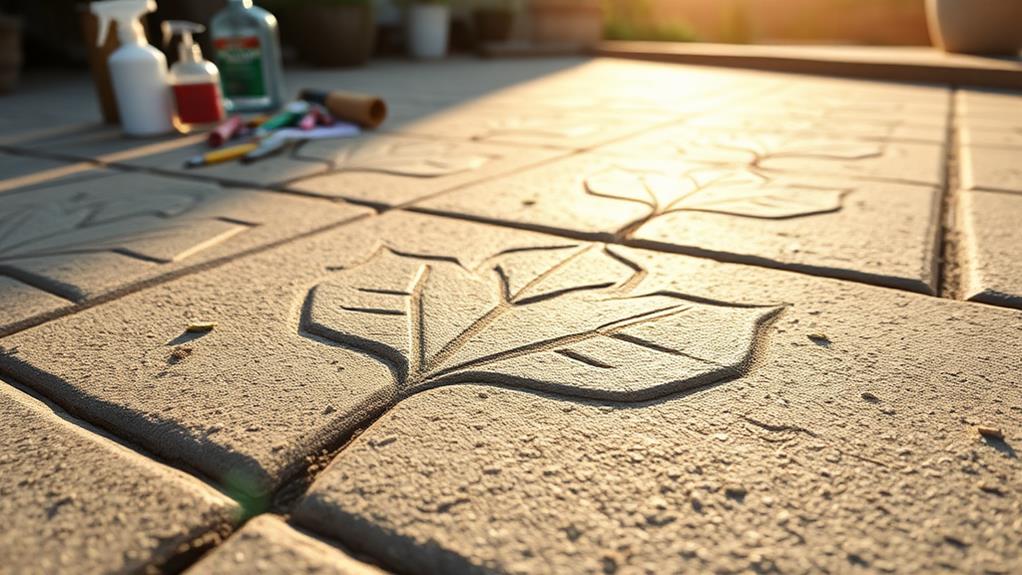
When considering decorative concrete finish options for your driveway, you'll find a range of choices to enhance its aesthetic appeal and complement your home's exterior. You can opt for stamped concrete patterns that mimic the look of brick, stone, or tile, explore exposed aggregate finishes that reveal the beauty of natural stones, or select from various colored concrete options to achieve your desired hue. The following table outlines some popular decorative concrete finishes, their characteristics, and potential applications:
| Finish Type | Characteristics | Applications | Maintenance |
|---|---|---|---|
| Stamped Concrete | Textured, patterned surface | Driveways, patios, walkways | Periodic sealing |
| Exposed Aggregate | Natural stone appearance | Driveways, pool decks, landscaping | Occasional pressure washing |
| Colored Concrete | Custom hues and tints | Driveways, indoor floors, decorative elements | Regular cleaning and resealing |
| Polished Concrete | Smooth, glossy surface | Interior floors, outdoor patios | Routine buffing and polishing |
Stamped Concrete Patterns
Stamped concrete patterns offer homeowners a versatile way to enhance the appearance of their driveways. These intricate designs can mimic the look of brick, stone, tile, or even wood, providing you with a cost-effective alternative to more expensive materials. When you choose stamped concrete for your driveway, you'll join a community of homeowners who value both aesthetics and practicality.
The process begins with selecting a pattern that complements your home's architecture and landscape. Popular options include herringbone, cobblestone, and slate textures. Once you've made your choice, skilled technicians will apply the pattern to freshly poured concrete using specialized stamps. They'll then add color hardeners and release agents to create depth and authenticity in the design. The final step involves sealing the surface to protect it from weathering and stains.
You'll find that stamped concrete not only elevates your home's curb appeal but also increases its value. Additionally, it requires less maintenance than traditional pavers or natural stone, allowing you to enjoy a beautiful driveway without the hassle of frequent upkeep or repairs.
Exposed Aggregate Finishes
Another popular decorative concrete finish for driveways is exposed aggregate. This technique involves removing the top layer of cement paste to reveal the underlying aggregate, creating a textured and visually appealing surface. You'll find that exposed aggregate offers a unique blend of durability and aesthetics, making it an excellent choice for homeowners who want to elevate their property's curb appeal.
To achieve this finish, you'll need to follow a specific process. After pouring the concrete, you'll allow it to partially set before applying a surface retarder. This chemical slows the curing of the top layer, enabling you to wash away the cement paste later. Once the concrete has cured sufficiently, you'll use a pressure washer to gently remove the surface layer, exposing the aggregate beneath.
The result is a driveway with a natural, stone-like appearance that's both slip-resistant and long-lasting. You can customize the look by selecting different types and colors of aggregate, allowing you to create a finish that complements your home's architecture and landscaping. With proper sealing and maintenance, your exposed aggregate driveway will continue to impress for years to come.
Colored Concrete Options
Colored concrete options offer a versatile way to enhance your driveway's aesthetic appeal. You'll find an array of choices that can complement your home's exterior and landscape design. Integral color admixtures, added during the mixing process, guarantee uniform pigmentation throughout the concrete. This method provides long-lasting results that won't fade or wear away over time.
Alternatively, you might opt for surface-applied color hardeners, which are broadcast onto freshly poured concrete and troweled into the surface. This technique creates a durable, richly colored top layer that's resistant to weathering and abrasion.
For those seeking more intricate designs, consider staining techniques. Acid stains react chemically with the concrete to produce unique, variegated colors that mimic natural stone or leather. Water-based stains, on the other hand, offer a wider range of hues and more predictable results.
You can also explore color hardeners combined with stamping patterns to achieve the look of brick, stone, or tile at a fraction of the cost. Whichever option you choose, colored concrete will elevate your driveway from a mere functional surface to a striking design element that enhances your property's curb appeal and value.
Concrete Contractor FAQ
How Long Does a Concrete Driveway Typically Last?
You'll be pleased to know your concrete driveway can last 20-30 years with proper care. It's a durable choice that'll make you feel confident in your home's curb appeal. Regular maintenance will keep it looking great for decades.
Can I Install a Concrete Driveway Myself, or Should I Hire Professionals?
You can install a concrete driveway yourself, but it's a challenging task. For best results, you'll want to hire professionals. They'll guarantee proper installation, saving you time and potential headaches while giving you a driveway you'll love.
What Maintenance Is Required for a Concrete Driveway?
You'll want to maintain your concrete driveway regularly. Seal it every few years, clean spills promptly, and repair cracks as they appear. Don't forget to clear snow and ice carefully. With proper care, you'll enjoy a long-lasting driveway.
How Soon Can I Drive on My Newly Installed Concrete Driveway?
You'll need to wait at least 7 days before driving on your new concrete driveway. It's pivotal for your driveway's longevity and your neighborhood's aesthetics. Be patient – you're investing in a beautiful, durable addition to your home.
Are There Environmentally Friendly Options for Concrete Driveway Installation?
You've got eco-friendly options for your driveway! Consider permeable concrete that allows water to seep through, reducing runoff. You can also use recycled materials or opt for locally-sourced aggregates. These choices show you're part of the green movement!
